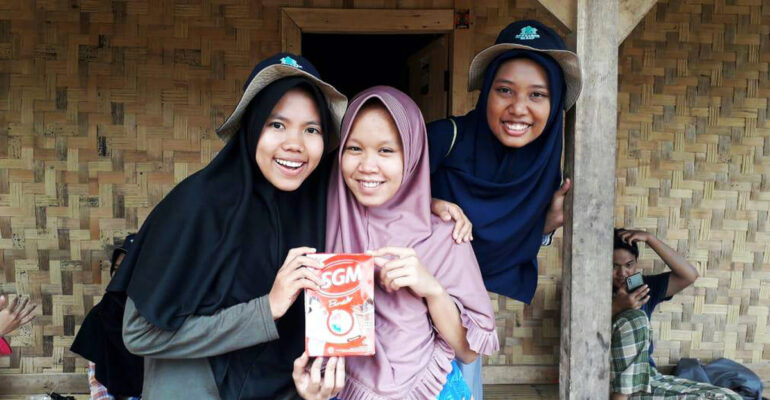Through Bara Muda, Fema IPB Performs Devotion in Baduy Mualaf Village

Community service is a form of tri dharma of higher education that must be carried out by the institution. Students as part of educational institutions should carry out sharing and learning activities with the community. A total of 13 students of the Faculty of Human Ecology (Fema) of IPB carried out community service through the movement of “Bara Muda (Baduy Prosper Muslim Powerful)”. This activity was carried out in the Landeuh Baduy Mualaf Village, Bojong Menteng Village, Leuwidamar District, Lebak Regency, Banten. The activity began with a site survey in early April and the program implementation was carried out on May 10-12. Activities are carried out in stages for one month.
The Baduy Mualaf community is a community of Outer Baduy who have migrated to embrace Islam and form their own settlement consisting of 29 family heads. The Baduy Mualaf community is directly out of their customary territory so that they are no longer entitled to their customary rights. According to Nurhayatul Ulfah, one of the Fema IPB students who participated in the program, at first the Baduy Mualaf community did not have separate settlements or villages, they were separated according to the area where they converted to Islam. “This sometimes threatens their survival because they go out of their way to become indigenous people. Separate settlements and scavenging individuals without support from anywhere, make some among the Baduy Community converts embrace the belief of “Sunda Wiwitan” which is commonly adopted by the Baduy. Based on this, in August 2018 a foundation helped establish a Baduy Mualaf community settlement in Bojong Menteng Village,” Nurhayatul continued.
Baduy Mualaf community is given home facilities to be able to continue their lives This condition changed their habits as indigenous people, namely gathering and farming. Currently the Baduy Mualaf community must buy all their household needs such as rice, vegetables, and other food needs. Whereas when they were part of indigenous communities they were able to obtain basic needs from forests and fields. The economic instability experienced by the community due to changes in identity makes them not independent in economic terms. People still rely on donations from various parties for their convert status. It is undeniable that this has an impact on the pattern of life and aspects of public health.
Nurhayatul further said, “On this basis, we believe that the empowerment program” The Young Bara Movement (Empowered Muslim Prosperity) through the Development of Independent Food Villages “is important to implement. This program will facilitate the community in a number of sub-developments, namely demonstration of planting horticulture plants in the yard to support family food, socialization and demonstration of balanced nutrition, demonstration of MPASI (ASI supplementary food), health checks (gout and blood sugar), and family consultations. The activity is carried out with two systems, namely gathering with residents in the village hall and visiting each of the residents’ houses.”
Nurhayatul said the community service activities were included in the Indonesian Hundred Healthy Ambassador program facilitated by Dompet Dhuafa and PT Exploration CSR and Production Public Company Limited (PTTEP) in collaboration with the Faculty of Human Ecology of IPB. “In activities in the field we collaborate with the Mbangundeso Faoundation Community as a community that first conducts activities in that location. “Through this service activity, it is hoped that the Baduy Mualaf community will help to increase their independence after changing their identity,” he explained. (RYS)


